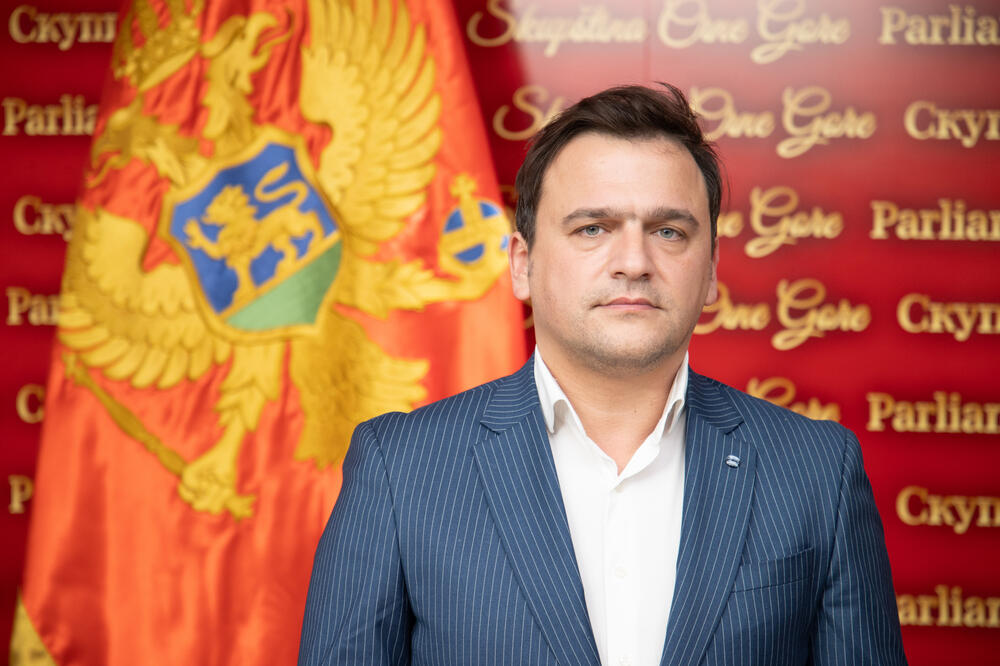The MP of the Europe Now Movement, Darko Dragović, announced that the Minister of Internal Affairs, Danilo Saranović, by not nominating another candidate for the position of police director, "obviously decided not to use his discretion by abusing his authority and not to propose a new candidate for acting police director".
Dragović also assessed that Šaranović tried in this way "to cause institutional chaos, that is, to prevent the election of the head of this very important state body".
The government, by a majority of votes, elected the head of the Sector for Financial-Intelligence Affairs, Aleksandar Radović, as acting director of the police, on the proposal of Prime Minister Milojko Spajić.
Previously, the government rejected Šaranović's proposal that Lazar Šćepanović be the acting director of the Police Administration.
Dragović also accused the Democrats of "aggressive media performance"
"Article 16 paragraph 3 of the Law on Internal Affairs defines that in the case of termination of the mandate of the police director before the end of the period for which he was appointed, or in the event that the police director is prevented from performing his duties permanently or for a long time for any reason, the Government will proposal of the Minister, appoint one of the managers of the internal organizational unit of the Police, who meets the requirements for the Director of the Police prescribed by this law, for a maximum of six months. Therefore, the duty and obligation of the Minister of the Interior is to propose the acting Director of the Police, while "The Government of Montenegro is the only one authorized to appoint the acting director of the police. It is not the minister who decides, but the Government," said Dragović.
He said that it is legally permissible for the Government not to accept the proposal of the Minister of Internal Affairs.
"In that case, the Minister of the Interior is obliged to propose to the Government another person as a candidate for the acting director of the Police Directorate. Minister Danilo Saranović obviously decided not to use his discretion by abusing his authority and not to propose a new candidate for the acting director of the police, trying to a way to cause institutional chaos, i.e. not to elect the head of this very important state body. The minister's discretionary right is not of an absolute nature, but is limited in order to achieve the best interests of the Police Administration, and indirectly, in order to protect the safety of the citizens of Montenegro and fight against all forms of crime".
In a statement, Dragović stated that in the case of Malone v. the United Kingdom (judgment of August 2, 1984, No. 8691/79), the European Court of Human Rights took the position that it would be against the rule of law if discretionary powers were granted to an executor expressed in the form of unrestrained power.
"Accordingly, the law must indicate the scope of any such discretionary power delegated to the competent authorities and the manner of its exercise with sufficient clarity, having regard to the legitimate aim of the measure in question, to afford everyone adequate protection against the arbitrariness of any individual acting in the name and on behalf of state authorities. It follows from the views of the European Court of Human Rights that the law must clearly indicate the extent of the discretionary powers of the competent authorities and the manner in which these rights are exercised. According to the court's understanding, the law must indicate the extent of discretionary powers the right entrusted to the authorized bodies and to regulate the use of that discretionary right in a sufficiently precisely formulated manner, in order to provide adequate protection against arbitrary decision-making," said Dragović.
He adds that "the positive legal provisions of the Law on Internal Affairs do not provide, to the degree that is reasonable under the circumstances, a way to remedy the consequences that could be caused by the abuse of the discretionary powers of the Minister of Internal Affairs by refusing to nominate the Acting Director of the Police Administration".
"Contrary to the above, the rights guaranteed by the Constitution and international legal acts would be illusory and theoretical, not real and effective, if there was no possibility of unblocking caused by the abuse of the discretionary rights of any individual, even if he was the Minister of the Interior, in order to protect public interests and the rule of law. It is precisely for this reason that the Government of Montenegro passed a conclusion authorizing Prime Minister Milojko Spajić to propose to the Government a candidate for acting director of the Police Directorate, because the line minister did not want to fulfill his legal obligation by trying to, for who knows whose interest , is blocking the process of electing the acting director of this institution. As, in particular, the Minister refused to propose a new candidate for the acting director of the Police Directorate, and as at that moment the main body in charge of citizen security threatened to be left without a manager, this is completely justified and according to the Constitution, the necessary reaction of the Government to authorize another person - the Prime Minister (the first minister who coordinates the work of the Government) to propose another candidate and thus ensure the continuity of the functioning of the Police Administration".
Dragović also announced that the public interest and the guarantee of constitutional rights, as well as fundamental rights and freedoms, is more important than the abuse of the minister's discretionary rights.
"Finally, I would like to remind the minister that, in contrast to the Government, which is a collegial body, it is an external body that may have entered the zone of criminal responsibility by consciously abusing its powers," concluded Dragović.
Bonus video:







